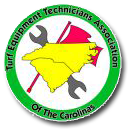History
“It all kind of happened by accident at the 2000 Carolinas Show,” says Rogers. “We were talking about equipment and then the topic kind turned toward maybe getting an association started.” A more formal meeting to explore the idea was scheduled for the 2001 Carolinas GCSA Conference. Rex Floyd, was serving as president of the CGCSA at the time. He hosted the service tech seminars that year and admits to not knowing what to expect at that first organizational meeting when they asked those interested to stay after the regular educational seminar.
August 1, 2005
The outmoded stereotype of a golf course mechanic — a guy of perhaps limited abilities, covered in grease and turning a wrench on a golf cart — is something the Turf Equipment Technicians Association of the Carolinas (TETAC) are striving to update.
“There’s a lot more to being a turf equipment technician than that,” says Dale Rogers, president of the three-and-half-year old organization. Today’s golf course mechanic (or turf equipment technician) generally has far more responsibilities than he had in past and is maintaining equipment that is far more technologically advanced than it once was, says Rogers.
“I’d like to see a little more credit going to the profession. Computerized diagnosis takes a higher level of thinking than your ëshade tree mechanicí has to have,” he says. “The service technician is responsible for parts inventory and for shop organization. Techs at some larger golf courses have their own budgets and sometimes help manage the crew, particularly when the superintendent is not around. There is a little more to it than just changing spark plugs.”
“The 100 Most Frequently Asked Questions By Service Technicians,” was added to conference’s seminar line-up when a previously scheduled seminar had to be scratched.
“I figured that after the seminar, we might have five people stay for the meeting,” says Floyd, who began his golf course maintenance career as a mechanic and then spent more than 20 years as an assistant superintendent and superintendent. By the time the organizational meeting began, however, roughly 60 mechanics had crowded into the room.
“After 15 or 20 minutes the room was just buzzing. These guys were just networking and asking questions…. After about an hour of discussion, I said, ‘Let’s see a show of hands of people who want to see a service technician association get started.’ The whole room raised their hands,” says Floyd, who has continued to serve as an adviser to the organization.
According to TETAC’s mission statement the purpose of the organization is to enhance the professional image of turf equipment technicians, to raise the safety awareness of technicians and to improve the technical knowledge of TETAC members though education and communication with the turf equipment industry.
Rogers, who went to work as a field service technician for Jacobsen-Textron after seven years as a golf course tech, says that TETAC also provides a framework for service techs to network about work-related issues. To that end, he says the association is developing a database that includes the contact information of member technicians and the type of equipment that is used at their golf courses. Technicians who have maintenance or repair problems with a particular piece of equipment can use the database to call on fellow technicians who may be able to offer practical advice. “TETAC is an organization for techs to get together to hash out issues, attend seminars and to really try to better the profession through education and self image,” says Rogers, a native of Carthage, NC.
TETAC attracted approximately 60 members in its first year and has grown by leaps and bounds ever since. Rogers believes TETAC is the largest state or regional turf technician association in America. Membership in TETAC is open to anyone involved in the turf equipment industry but Rogers estimates that 75 percent of members are golf course service techs. The remaining 25 percent consists of vendors, vendor field techs, and superintendents. While the majority of members reside in North Carolina or South Carolina, there are also members from Georgia, Tennessee and Virginia.
Despite the impressive growth of the association in its first three and half years, Rogers says he expects TETAC membership to increase even more in coming years. “We didn’t have in mind at its inception how big this could actually get and how quickly. And so far we’ve only tapped about 10 percent of the total number of technicians in North and South Carolina,” he says.
Code of Ethics
1. Uphold the Code of Ethics of this association.
2. Recognize and discharge all my responsibilities and duties in such a fashion as to be a credit to this association and profession.
3. Maintain the highest standards of personal conduct to reflect credit and add to the stature of the profession of Equipment Technician.
4. Base endorsements, either verbal or written, by means of any medium, strictly upon satisfactory personal experiences with the item or product identified.
5. Recognize and observe the highest standards of integrity in relationships with fellow Equipment Technicians and others associated with this profession and industry.
6. Assist my fellow Equipment Technicians in all ways consistent with my abilities only when called upon to do so and with the incumbent Technicians knowledge, participation, and acceptance.
7. Abstain from the debasement of, or encroachment upon, the professional reputation, practice, or employment of another Equipment Technician.
8. Lend my support to, and actively participate in, the effort of this association and other affiliated associations to improve understanding and recognition of the profession of Equipment Technician.
9. Abstain from any exploitation of my association, industry, or profession.
10. Abstain from the use of any and all mind altering substances while on the job and during all meetings of this association.
